Professor Sir Hew Strachan FBA, FRSE 
Hew Strachan, FBA, FRSE, Hon. D. Univ (Paisley) has been Wardlaw Professor of International Relations at the University of St Andrews since 2015. He is a Life Fellow of Corpus Christi College, Cambridge, where he taught from 1975 to 1992, before becoming Professor of Modern History at Glasgow University from 1992 to December 2001. He was Chichele Professor of the History of War at the University of Oxford and a Fellow of All Souls College 2002-15 (where he is now an Emeritus Fellow), and Director of the Oxford Programme on the Changing Character of War 2003-2012. He was a Commonwealth War Graves Commissioner 2006-18 and a Trustee of the Imperial War Museum 2010-17 and served on the national committees for the centenary of the First World War of the United Kingdom, Scotland and France. In 2010 he chaired a task force on the implementation of the Armed Forces Covenant for the Prime Minister. In 2011 he was the inaugural Humanitas Visiting Professor in War Studies at the University of Cambridge and became a specialist adviser to the Joint Parliamentary Committee on the National Security Strategy. He is a Captain in the King’s Bodyguard for Scotland (Royal Company of Archers). In December 2012, Foreign Policy magazine included him in its list of top global thinkers for the year. He was knighted in the 2013 New Year’s Honours and was appointed Lord Lieutenant of Tweeddale in 2014. In 2016 he was awarded the Pritzker Prize for Lifetime Achievement for Military Writing. His publications include The Politics of the British Army (1997); The First World War: To Arms (2001); Clausewitz’s On War: a Biography (2007); The First World War: a New Illustrated History (2003); and The Direction of War (2013).
Major General Tim Hodgetts 
Major General Tim Hodgetts is the Surgeon General of the United Kingdom Armed Forces; the Master General of the Army Medical Services; the Chair of the Committee of Military Medical Chiefs in NATO (COMEDS); and Deputy Lieutenant for the County of West Midlands.
Tim was commissioned in 1983 and trained at Westminster Medical School, qualifying with distinction in 1986. He holds fellowships with the Royal College of Physicians of London, Royal College of Surgeons of Edinburgh, Royal College of Emergency Medicine, Faculty of Pre-hospital Care, Institute of Healthcare Managers, and the Royal Geographical Society. He has a PhD in Public Health (‘A revolutionary approach to improving combat casualty care’); Master’s degrees in Medical Education and Business Administration; and is a Chartered Manager. He graduated from Joint Command & Staff College in 2011 and the Royal College of Defence Studies in 2018.
Tim’s professional career began as a general physician in the British Military Hospital in Hannover, progressing to higher training in emergency medicine in Manchester and Sydney. He became Consultant in Emergency Medicine at Frimley Park Hospital from 1995, transferring to the Royal Centre for Defence Medicine in 2001 on its inception, where he served until 2010. He was first appointed Professor in 1998 at the European Institute of Health and Medical Sciences, then at the University of Birmingham (2001), City University of London (2013) and the Military Medical Academy in Belgrade (2023). He was the inaugural Defence Professor with the Royal College of Emergency Medicine, and Penman Foundation Professor of Surgery in South Africa for 2011.
Within Defence Tim has been responsible for nurturing the specialty of emergency medicine from infancy to maturity. He has implemented concept, doctrine, equipment and practice changes to transform the early management of combat injury and led major trauma governance from 1997-2010. Clinical leadership appointments have included Defence Consultant Adviser in EM (1997-2008); and Assistant Director Clinical Services at RCDM (2001-2007). He has served on operations in hospitals in Northern Ireland, Kosovo, Oman, Afghanistan (3 tours), Kuwait and Iraq (4 tours). On 6 of these tours he was the hospital’s Medical Director, including the multinational Danish-UK-US hospital in Afghanistan, 2009. From 2011-13 he was Medical Director within NATO’s Allied Rapid Reaction Corps; and from 2014-17 he was Medical Director for the Defence Medical Services. From 2018 until assuming his role as Surgeon General he has was the Army’s Senior Health Advisor, the Head of the Army Medical Services and a Commissioner at the Royal Hospital Chelsea. He was elected by the nations to be Chair COMEDS in 2021 and was appointed Master General of the Army Medical Services in 2022.
Tim has published extensively (books & journal articles) and regularly lectures internationally as a keynote speaker on leadership, innovation at pace, disaster medicine and combat casualty care. He is co-author of Major Incident Medical Management and Support; Battlefield Casualty Drills; Army Team Medic; Battlefield Advanced Trauma Life Support; and Clinical Guidelines for Operations. He co-founded the citizenAID® charity from 2017, designing a free multi award-winning app to support the public during a terrorist attack and inventing a new device (the Tourni-Key™) for the public to treat life-threatening limb bleeding.
Tim was made Officer of the Order of St John of Jerusalem in 1999; Commander of the British Empire in 2009; and Companion of the Order of the Bath in 2023. He received the Danish Defence Medal for Meritorious Service in 2010. Tim was Queen’s Honorary Physician from 2004 to 2010, then Queen’s Honorary Surgeon in 2018 and King’s Honorary Surgeon from 2022. In 2010 he received the Defence Scientific Adviser’s Commendation for contribution to research and has been awarded 18 academic medals, including the prestigious Mitchiner Medal of the Royal College of Surgeons of England. His academic department was twice recognised nationally as the “Training Team of the Year” and in 2006 he was honoured with the personal accolade of Hospital Doctor of the Year throughout the NHS. He was named in a British Medical Association dossier as one of the most innovative doctors in the country.
Gerard R. Cox, MD, MHA 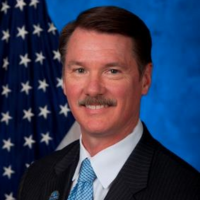
Gerard R. Cox, MD, MHA was appointed Assistant Under Secretary for Health for Quality and Patient Safety in June 2020. His title changed to Associate Deputy Under Secretary for Health when his office was realigned under the Office of the Deputy Secretary in March 2024. Since joining VA in 2014, Dr. Cox has served in senior executive positions including Assistant Deputy Under Secretary for Health for Policy and Services, Interim Medical Inspector, Assistant Deputy Under Secretary for Health for Integrity, and Deputy Undersecretary of Health for Organizational Excellence.
During his previous military career of more than 30 years as a U.S. Navy medical officer, he served in a series of hospital leadership roles with increasingly complex responsibilities including service chief, service line leader, chief operating officer, and chief executive officer. He held executive positions on the staffs of the Navy Surgeon General, the Commandant of the Marine Corps, the Commander of U.S. Navy forces in the Middle East, and the Naval Inspector General. He also served as a White House physician for Presidents William J. Clinton and George W. Bush.
Following his undergraduate and medical education, Dr. Cox completed a medical internship at the National Naval Medical Center and the combined residency program in emergency medicine at Georgetown University, George Washington University, and the University of Maryland. He is board-certified in emergency medicine, occupational medicine, and health care administration and is a Fellow of the American College of Emergency Physicians, the American College of Preventive Medicine, and the American College of Healthcare Executives.
Professor Ben Wadham 
Professor Ben Wadham is the Director of Open Door: Understanding and Supporting service Personnel and their Families research initiative which is part of the Flinders Institute for Mental Health and Wellbeing. Ben is a veteran who served in the Australian infantry and as a Military Police Corporal before stumbling across university studies in 1992. Ben adopts a social health approach to veteran and family wellbeing. He has conducted pioneering studied in institutional abuse in the Australian Defence Force and recently completed the first national study of incarcerated veteran sin Australia.
He is a representative on the Royal Commission into Defence and Veteran Suicide Lived Experience Research Advisory Group. His current project includes the study Veteran Suicide: Investigating the Social Had Historical Dimensions, a review of the DVA Chaplaincy Program and work on RPL/CPL for veterans adopting university as a transition pathway. Ben led the development of the Military Academic Pathway – the only foundation course for veterans in Australia that draws upon military skills and experience and doesn’t require a tertiary ranking score or matriculation which ash seen about 150 veterans find their way to university.
Ben has advised the DVA on the changes to veteran entitlement legislation the reorientation of their strategic research plan. He has also recently given expert testimony to the DVSRC and advised them on military justice, ADF ranks and promotions and produced the report on military culture and military institutional abuse and its relationship to veteran self-harm and suicide which forms the basis of this presentation.
Professor Suzette Brémault-Phillips 
Dr. Suzette Brémault-Phillips is an Occupational Therapist and Professor in the Department of Occupational Therapy, Faculty of Rehabilitation Medicine, University of Alberta, and Director of the Heroes in Mind Advocacy and Research Consortium (HiMARC), a provincial hub for research, teaching and service in support of military members, Veterans, public safety personnel and their families. Her research interests include resilience, well-being, moral injury and mental health. Dr. Brémault-Phillips is Chair and Principal Investigator of the Canadian Military, Veteran and Family Connected Campus Consortium (cmvf3c.ca).
Professor Karl Hamner 
Karl is a Clinical Professor and Director, The Office of Evaluation Research and School Improvement in The University of Alabama’s (UA) College of Education. He conducts mixed-methods research on improving transitions from military service to civilian life using mixed-method community-based participatory research within an ecological framework, improving Veteran suicide prevention by using an ecological lens, the impact of biopsychosocial interventions to improve well-being, and the effectiveness of education programs and policies. He serves on the Alabama Governor’s Challenge to Prevent Suicide among Servicemembers, Veterans and their Families, the UA Council for Community-Based Partnerships, and is Chair of the International Advisory Group for the Flinders University grant from the Australian Research Council “Veteran suicide: Investigating the historical and social dimensions.” Dr. Hamner received his Ph.D. in Sociology from the University of California, Los Angeles in 1993.
Dr Jane Potter 
Jane Potter is Reader in Arts at the Oxford International Centre for Publishing, Oxford Brookes University, UK. She is the editor of A History of World War I Poetry (2023) and Wilfred Owen: Selected Letters (2023). Her other publications include Boys in Khaki, Girls in Print: Women’s Literary Responses to the Great War, 1914-1918 (2005) and with Carol Acton, Working in a World of Hurt: Trauma and Resilience in the Narratives of Medical Personnel in War Zones (2015).
Doctor Alisha Ali 
Alisha is an Associate Professor in the Department of Applied Psychology at New York University. She heads the Advocacy & Community-Based Trauma Studies (ACTS) lab. Her research includes the development and evaluation of the DE-CRUIT program which uses theatre to treat the effects of trauma among military veterans. Her other current projects include investigations into empowerment-based programs for domestic violence survivors and low-income high school students.
She has presented her research to a range of international audiences, including the World Economic Forum and the United Nations Development Program. She is co-editor (with Dana Crowley Jack) of the book Silencing the Self Across Cultures: Depression and Gender in the Social World (Oxford University Press), co-editor (with Niobe Way, Carol Gilligan & Pedro Noguera) of the book The Crisis of Connection (NYU Press), and co-editor (with Bradley Lewis & Jazmine Russell) of the book The Mad Studies Reader (Routledge Press). Her work has been funded by numerous agencies including the National Institute of Mental Health, the Institute of Education Sciences, the National Endowment for the Arts, the National Endowment for the Humanities, Allstate Foundation, the Military Psychology Division of the American Psychological Association, Wellcome Trust, American Psychological Foundation, Loeb-Thirdpoint Foundation, Spencer Foundation, New York Community Trust, Einhorn Family Charitable Trust, Robin Hood Foundation, Canadian Race Relations Foundation, Social Sciences and Humanities Research Council of Canada, Fordham Street Foundation, the Group Foundation for Advancing Mental Health, Humanities New York, and the Laurie M. Tisch Illumination Fund.
Doctor Ali received her B.Sc., M.Sc. and Ph.D. degrees from the University of Toronto.
Dr Carl Strathearn 
Dr Carl Strathearn is a lecturer in computer science at ENU. His research is focused on embodied artificial intelligence and socially assistive humanoid robots in domains such as education and healthcare. His work on machine learning for robotic lip synchronisation was listed in BBC Science’s top 13 scientific moments of 2021 and his research in developing a Multimodal Turing Test for Robots was published in The Gurdian and The Conversation.
During his PhD he was a regular guest on BBC Radio as an expert commentator on humanoid robots and received the Sir Patrick Stewart Award for academic excellence. He is a co-editor for the D&D special edition ‘Embodied Conversational Systems for Human-Robot Interaction’ and was recently a guest speaker on the EPSRC Robotics & Autonomous Systems Network ‘Robot Talk’ podcast.
He completed a three-year postdoc at ENU in which he developed a novel vision and language system for assistive robots using large language models (LLMs) and image segmentation for task-based rehabilitation and skills training.
Website: www.carlstrathearn.co.uk
Professor Matt Fossey FRSA 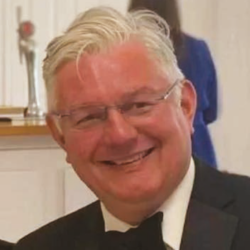
Matt Fossey is a Professor of Public Services Research at Anglia Ruskin University (ARU). He has a background in social work, national health policy and service delivery. He is particularly interested in demonstrating research impact.
In 2015 Matt founded the Veterans and Families Institute at ARU, and has grown the Institutes status and reputation, including the 2022 launch of the Centre for Military Women’s Research. With 15 staff, over 200 publications and £7 million in research income, the VFI is recognised as an international leader for social research with the military, veterans and their families.
Matt is co-chair of the NATO military sexual violence research panel, and an advisor to the MOD, NHS, Office for Students and Cabinet Office. He is also a member of the international ministerial working group considering wellbeing in the military and veteran’s communities.
Matt has recently led a team to win over £11 million in Research England funding to set up a new Centre for Equalities in Uniformed Public Services. He is also a co-Investigator on a £5 million NIHR Public Health grant researching the social determinants of health across greater Essex.
Professor Thanos Karatzias 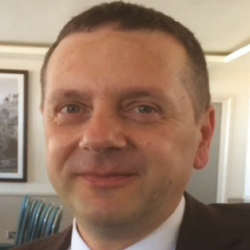
Professor Thanos Karatzias, is the Head of Research in the School of Health & Social Care at Edinburgh Napier University, UK and Clinical & Health Psychologist at the Rivers Centre for Traumatic Stress, Edinburgh, UK. He is the former Chair of the British Psychological Society Scotland Working Party for Adult Survivors of Sexual Abuse (BPSSS) and he was a member of the Committee of the British Psychological Society (BPS) Crisis, Disaster & Trauma Section. He has spent his entire clinical and academic career working in the field of psychological trauma, particularly on interpersonal psychological trauma. In collaboration with national and international research partners he has developed a special interest in the effects and treatment of psychological trauma on physical and mental health; on general, prison and veteran populations as well as on people with learning disabilities. The last few years he works in the area of Complex PTSD and its treatment, a new condition in the recently published ICD-11. Prof. Karatzias, has published widely in these areas.
Graham R. Short MBE, TD 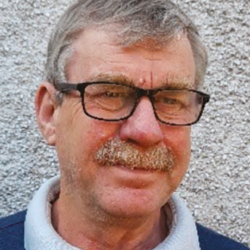
Graham attended King Edward V1 Grammar School, Louth, Lincolnshire. Having attended both Cambridge and Glasgow universities he took up a post as a geography teacher in Kilmarnock, Ayrshire and ultimately became a school inspector with Strathclyde Regional Council.
After a succession of jobs in central education services Graham became Depute Director of Education in East Ayrshire Council. He was seconded to Her Majesty’s Inspectors of Education (HMIE) to develop a framework for the inspection of education authorities (INEA) and participated in the inspections of a number of Councils. He also served on the national Expert Group on Parental Involvement and on the working group developing national guidance for the
Education (Additional Support for Learning) (Scotland) Act, 2004. In 2006 he became Executive Director of Educational and Social Services for East Ayrshire in which capacity he represented Scotland at an institute on the management of change at Harvard university. He retired from East Ayrshire in March in 2015 and was awarded the MBE for services to education in the Birthday Honours of that year. Graham was a commissioned officer in the Territorial Army for 19 years
serving as a Cameronian, Royal Scots Fusilier and a Glasgow Highlander and attaining the rank of major. His hobbies include running (having completed marathons in London, New York, Las Vegas, Antarctica and Mongolia), reading, and gardening. He is married with two sons and five grandchildren.
Adrian Kirk CEO 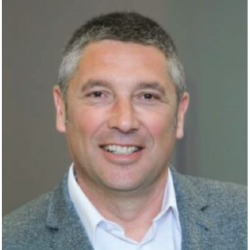
Adrian joined the Royal Navy in 1988 and served as an Aircraft Engineer for 29 years in the Fleet Air Arm, serving in several squadrons, units, and ships, and seeing operations in the Balkans and Gulf War II. Gaining a Commission in 1993, he undertook a broad range of appointments spanning media, HR, project & programme management, aviation regulation, as well as core Front Line aircraft engineering jobs. Having had a fantastic military career with opportunities he would never otherwise have had, upon leaving the Royal Navy in 2017, Adrian wanted to ‘give something back’ and became a Volunteer Mentor with Care after Combat. With the Covid 19 pandemic bringing even more challenges for our Veterans, he took up the offer of joining the team full-time and helped set up and develop a remote support service known as Bowman, a service which has proven a great success. He was commissioned by the board of Trustees to undertake a strategic review of the charity at the end of 2020 and was appointed as Chief Executive Officer in January 2021.
Dr Jane Jones 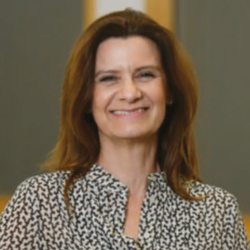
Dr Jane Jones, Doctor of Health & Social Care Practice. Jane is the Clinical & Research Lead for Care after Combat, in addition Jane is also the Clinical Lead overseeing a unique partnership of services between Nottinghamshire Offender Healthcare and Care after Combat. The partnership known as Veteran Care through Custody meets the needs of military veterans who are subject to a custodial sentence. Jane has an in-depth understanding of mental health and well-being, particularly psychological trauma, taken from a career working across specialized mental health and forensic settings. 1989 – 2000 Jane worked alongside the Armed Forces Mental Health Services in the UK and overseas providing healthcare for serving military personnel and their families. 2000 – 2017 Jane co-developed and delivered psychological programs for the National High Secure Healthcare Service for Women and Male High Secure Personality Disordered Services Rampton Hospital. This work was adopted across medium and low secure services across the UK and abroad. 2017 – Jane developed and delivers the Veteran Care through Custody service specialising in the needs of military veterans in the Justice System.
Professor Bill Buchanan OBE, FRSRE 
William (Bill) J Buchanan OBE, FRSRE is a Professor in the School of Computing, Engineering and the Built Environment at Edinburgh Napier University, and a Fellow of the BCS and a Principal Fellow of the HEA.
He was appointed an Officer of the Order of the British Empire (OBE) in the 2017 Birthday Honours for services to cybersecurity. Bill lives and works in Edinburgh and is a believer in fairness, justice, and freedom. His social media tagline reflects his strong belief in changing the world for the better: “A Serial Innovator. An Old-World Breaker. A New World Creator.” He also has a strong belief in the power of education and in supporting innovation from every angle and he currently leads the Blockpass ID Lab and the Centre for Cybersystems, IoT and Cyberphysical. In 2023, he received the Most Innovative Teacher of the Year at the Times Higher Awards (the “Oscars of Higher Education”), and, in 2024, he was elected as a Fellow of the Royal Society of Edinburgh (FRSE). Bill works in the areas of cryptography, blockchain, trust and digital identity. He has one of the most extensive cryptography sites in the World (asecuritysite.
com) and is involved in many areas of novel research and teaching. Bill has published over 30 academic books and over 350 academic research papers. Along with this, Bill’s work has led to many areas of impact, including three highly successful spin-out companies (Zonefox, Symphonic Software and Cyan Forensics), along with awards for excellence in knowledge transfer and for teaching. Bill recently received an “Outstanding Contribution to Knowledge Exchange” award and was included in the Future Scot “Top 50 Scottish Tech People Who Are Changing The World”.
Dr Sharon McDonnell 
Sharon is the founder and Managing Director of Suicide Bereavement UK, an internationally recognised award-winning organisation, which specialises in suicide bereavement research, training and consultancy. Sharon is an Honorary Research Fellow at the University of Manchester and a Winston Churchill Fellow. Sharon is also an ex army wife and personally bereaved by suicide. She has specialised in suicide bereavement research, for over 20 years and is recognised as an international expert in this field. Sharon has led several ground-breaking research projects including i) the translation of research findings into PABBS evidence-based suicide bereavement training, which is first of its kind internationally; and ii) led the national suicide bereavement survey, which is the largest suicide bereavement survey internationally. She has received several awards for her work in this field. She has recently led an Armed Forces suicide bereavement study, commissioned by NHS England. This involved interviewing people from the Armed Forces community (i.e. serving personnel, ex-service and families) who have lost someone serving/previously served to suicide. The findings from the study, informed the development of Suicide Bereavement UK’s ‘At Your Side’ guides for those bereaved by suicide the Armed Forces community. Both the Armed Forces study and guides are first of their kind internationally. Sharon will discuss why it is important to care for those bereaved by suicide in the Armed Forces community.
Jilly Carrell, CEO 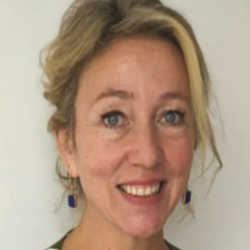
Jilly Carrell was an army spouse for 20 years and has been a military widow for 3. Their daughters were 12 and 14 when Nick died at the end of lockdown. Her husband Colonel Nick Carrell served with both the Lifeguards and the Adjutant General’s Corps. As a family they experienced six tours of Afghanistan, and before his death, Nick was diagnosed with complex PTSD. Jilly had worked in the armed forces charity sector for 15 years, in policy, community development and funding. Prior to that she worked in public affairs for an investment bank in the City. Since becoming a military widow, Jilly has campaigned for greater awareness and a better life pathways for bereaved armed forces families. 2 months ago, she founded beyondthewire.org.uk. She lives in Winchester with her two daughters who are at school there, her four dogs and two cats. In her spare time, which is like hens teeth, she writes stories about the home front. Last year she was shortlisted for four main literary prizes and her first work was published.